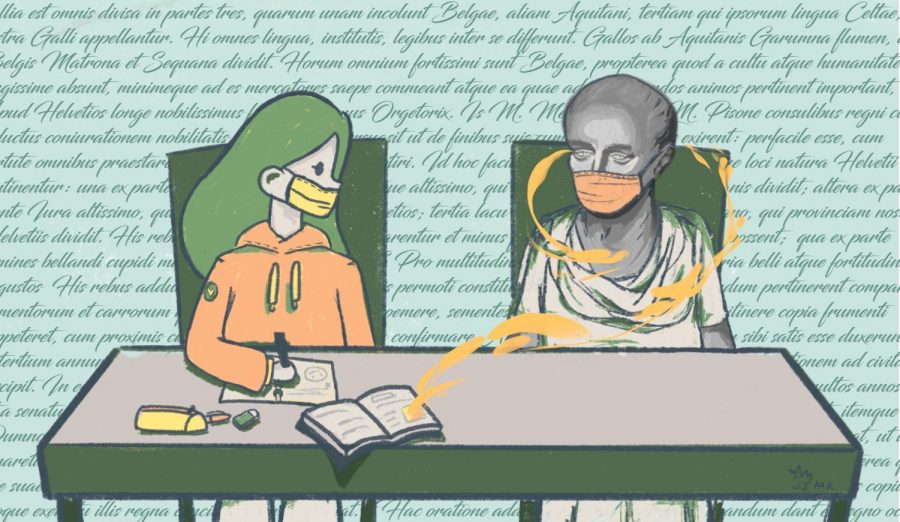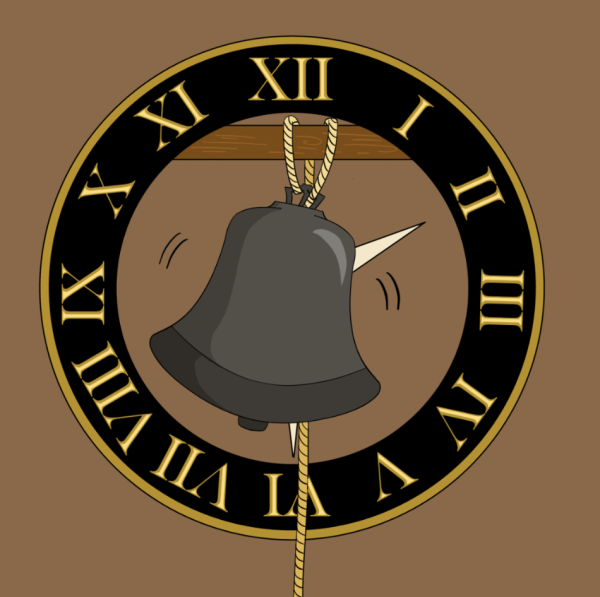The Pursuit of Classics is a Sine Qua Non (“essential condition”) of a Groton Education
What do Mark Zuckerberg, J.K. Rowling, Boris Johnson, and Drew Brees share in common? This seemingly motley crew of individuals who have achieved the highest success in their respective fields is unified in their love of the Classics.
The study of Latin and Ancient Greek was once indispensable to the ethos of humanity’s greatest individuals. In fact, it was even required for entrance into the most prestigious American and British universities. But now, Classics has largely become an afterthought in the modern era.
At Groton, the dual language requirement, which requires incoming Lower School students to take both a modern and Classical language through at least the second level, was temporarily suspended “due to challenges of hybrid and remote learning imposed by the pandemic,” according to Head of the Classics Department Amy Martin-Nelson. As a result, many students dropped Latin and thereby missed out on an integral component of their Groton education. To be sure, the administration assured that the changes to the Dual Language requirement would not be permanent; still, I would like to take this opportunity to explain what those who chose not to take Latin (or Ancient Greek) missed out on and revisit the essentiality of the study of Classics.
The benefits of studying the Classics come from both the examination of Latin and Ancient Greek as languages and the study of Greco-Roman civilization. The most obvious merit is that students gain essential practical skills, or “habits of mind,” Ms. Martin-Nelson says. These “habits of mind” are applicable to other purposes than solely regurgitating the third declension. By breaking down sentences and even words into their smallest components, students consider grammar and syntax in a way that fosters devotion to details and logical thinking. As Latin and Greek are very specific, technical languages, the process of translation is often compared to solving a complex puzzle, further evincing the intellectually demanding nature of the Classical languages. Everything must fit together perfectly; otherwise, everything falls apart. “I applied the skills I learned from Latin to writing English essays. Focusing on cohesiveness, I was able to write essays whose different ideas fit together nicely under an overarching theme,” Colin Kim ’23 notes.
Understandably, many Lower Schoolers who enter Groton find themselves struggling to wield the high level of critical thinking and analysis that their coursework demands. The Classics requirement fills this gap and sets a positive example for students by ensuring that they grow an appreciation for intellectual rigor.
Moreover, studying Classical languages grants easy access to many modern languages. Latin scholars can easily learn the Romance languages: Portuguese, Spanish, French, Romanian, and Italian. In fact, the concepts of word agreement, inflected nouns, conjugated verbs, and grammatical gender have survived in these direct descendants of Latin. As for English, 60% of all words have Latin and Greek roots, and in the vocabulary of sciences and technology, that figure increases to a staggering 90%, according to Dictionary.com.
Not surprisingly, students have discovered that they have gained an enhanced understanding of English because of their studies in Latin and Greek. Theo Gillibrand ’22 says that learning Latin “was more helpful than a general English class because it scrutinized important grammatical concepts like word agreement and verb tense.” He also added that the “analytical and vocabulary skills [he] acquired through Latin helped him significantly with the reading and writing sections on the ACT,” which measure a test taker’s ability to process information and identify grammatical errors, respectively.
However, it would be foolish to examine Latin and Greek as languages per se. The nature of Classics is inherently interdisciplinary, as Classical works tackle fundamental human values — “the building blocks of civilization,” as Harvard University’s Department of Classics puts it — in various fields: art, philosophy, religion, science, and history. The study of humanity’s arguably greatest intellectuals inspires conversations that touch hearts and minds everywhere. From the Romans’ respublica to the Pythagorean theorem, the extent to which Greco-Roman thinkers lay the foundations for modern academia is profound; a student armed with an education in the Classics would be able to provide invaluable insight to a World and the West discussion or even astrology class.
“Why can’t we read the works of Classical authors in translation? Why waste our time studying dead languages?” some might quip. But to suggest that reading a piece of literature in a different tongue has the same educational benefits is ludicrous. After all, for those of you that are multilingual, think about the times when you desperately wanted to use a word in another language to convey a particular meaning in English. Language is inextricably linked with culture, and thus, in a translation, nuance is utterly lost.
It is important to note that studying classics in high school doesn’t mean you have to delve into Cicero and Homer for the rest of your life (although that’s a laudable option). Classics scholars can easily transition into professional disciplines, especially those that require entrance into competitive graduate programs. According to Harvard Magazine, Classics majors in undergraduate programs, alongside math majors, boast the “highest success rate of any majors in law school.” Moreover, Cynthia Bannon, an associate professor of classics at Indiana University-Bloomington, explained in an interview with U.S. News that “classics majors fare well in the medical school process… we have been told that a major in Greek or Latin helps the candidate to stand out from the pack.” This is merely another testament to the value of the intellectual skills a training in Classics fosters.
If Groton truly wishes to inspire lives of scholarship and diligence, it must retain its Dual Language requirement. If the school wishes to instill a lifelong passion for problem-solving and critical thinking, we must continue to study the Classics. A fundamental study of the human condition, the Classics will be always living, and we must carry its rich legacy into the future.








